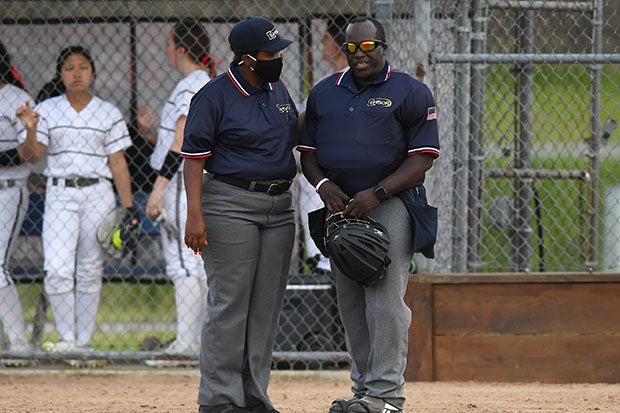The decline in numbers of referees, umpires and officials for high school sports isn't a new problem. But make no mistake, it is a problem.
In her
April column, National Federation of State High School Associations (NFHS) CEO Karissa Niehoff notes a survey that indicates 50,000 individuals have quit officiating high school sports since the 2018-19 school year.
Certainly, the pandemic played a part in that decline. So too does the fact many men and women officiating are getting older and no longer have the drive or ability to keep coming out year after year.
But the biggest factor in the decline in sheer numbers of officials is fan behavior. To put it bluntly, they're tired of the abuse.
"After all, why would anyone who is trying to help high school students compete on the fields and courts want to be harassed, ridiculed and abused — sometimes even physically — while trying to do their jobs?" writes Niehoff in her April column.
Social media has amplified hundreds of examples of unruly — possibly criminal — fan behavior toward officials.

Over 20,000 officials and referees have stepped away since 2018-19, according to a survey of state high school associations.
Photo: Parker Waters
Brian Barlow is an Oklahoma soccer referee who's battling back against boorish fan behavior. His Facebook page "Offsides" publicly chastises physically and verbally abusive fan behavior at the youth and high school level. He offers $100 for videos of unruly fan actions and has posted a small number of the more than 6,000 videos to his more than 63,000 followers.
"These parents have this mentality of, ‘We pay all this money and travel all this way, we expect the best, and referees can't make mistakes.' " he says in a
Global Sports Matters article. "It's based on society saying it's OK to yell at people in public if they're not giving you what they want. It's asinine."
Referees miss calls. It's the human element of the game where we ask men and women, some just starting their officiating career, to get 100 percent of the calls to our liking (not correct, mind you), 100 percent of the time.
It's an impossible standard that none of us could manage in our professional careers.
But they're being paid comes the refrain. Yes, and referee associations have, or should have, mechanisms to grade, critique and mentor officials.
But intimidation? Violence? Never.
You've never seen a referee scold a player or coach for making a mistake on the field, diamond or court, yet we think nothing of the tables being turned as an official is berated.
"Sporting behavior has gotten worse," said Barry Mano, founder and president of the National Association of Sports Officials (NASO) in the Global Sports Matters piece. "It's harder to do this under this constant scrutiny. COVID opened the door that was ajar regarding the officiating shortage with people questioning, ‘Why am I doing this?'"
Which gets to the crux of the issue: There may come a day where two teams show up but officials do not.
We've seen schedules juggled around the country in order to ease the burden on diminished numbers of referees. In some cases, baseball and softball games are officiated with only the home plate umpire, while basketball games are sometimes covered by one official.
The solution to a complex problem years in the making isn't easy. But it's not rocket science either.
First and foremost, unruly fan behavior needs to be snuffed out. It's the quickest way to ensure a young, enthusiastic referee will decide to stick it out and hone his craft. Adopt strict and harsh rules, as some state associations already have, banning unruly and abusive fans.
Second, increasing compensation will not only keep many officials coming back, but entice younger referees to, perhaps, stick it out and maybe draw in new blood. No one gets wealthy being a referee, but for many it is enjoyable to remain part of a game he or she loves while also earning some extra cash.
Third, mentor young officials. Pair older and younger referees and let the newer ones learn the ropes from the veterans.
If those changes seem unrealistic or unreasonable, imagine life without high school sports.
